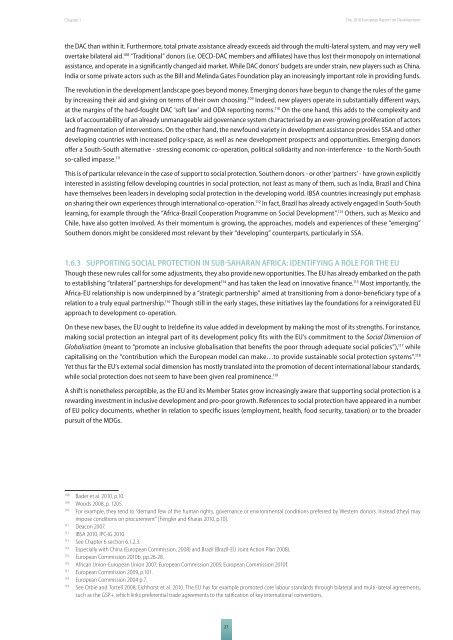social protection for inclusive development - European Report on ...
social protection for inclusive development - European Report on ...
social protection for inclusive development - European Report on ...
Create successful ePaper yourself
Turn your PDF publications into a flip-book with our unique Google optimized e-Paper software.
Chapter 1<br />
The 2010 <str<strong>on</strong>g>European</str<strong>on</strong>g> <str<strong>on</strong>g>Report</str<strong>on</strong>g> <strong>on</strong> Development<br />
the DAC than within it. Furthermore, total private assistance already exceeds aid through the multi-lateral system, and may very well<br />
overtake bilateral aid. 108 “Traditi<strong>on</strong>al” d<strong>on</strong>ors (i.e. OECD-DAC members and affiliates) have thus lost their m<strong>on</strong>opoly <strong>on</strong> internati<strong>on</strong>al<br />
assistance, and operate in a significantly changed aid market. While DAC d<strong>on</strong>ors’ budgets are under strain, new players such as China,<br />
India or some private actors such as the Bill and Melinda Gates Foundati<strong>on</strong> play an increasingly important role in providing funds.<br />
The revoluti<strong>on</strong> in the <str<strong>on</strong>g>development</str<strong>on</strong>g> landscape goes bey<strong>on</strong>d m<strong>on</strong>ey. Emerging d<strong>on</strong>ors have begun to change the rules of the game<br />
by increasing their aid and giving <strong>on</strong> terms of their own choosing. 109 Indeed, new players operate in substantially different ways,<br />
at the margins of the hard-fought DAC ‘soft law’ and ODA reporting norms. 110 On the <strong>on</strong>e hand, this adds to the complexity and<br />
lack of accountability of an already unmanageable aid governance system characterised by an ever-growing proliferati<strong>on</strong> of actors<br />
and fragmentati<strong>on</strong> of interventi<strong>on</strong>s. On the other hand, the newfound variety in <str<strong>on</strong>g>development</str<strong>on</strong>g> assistance provides SSA and other<br />
developing countries with increased policy-space, as well as new <str<strong>on</strong>g>development</str<strong>on</strong>g> prospects and opportunities. Emerging d<strong>on</strong>ors<br />
offer a South-South alternative - stressing ec<strong>on</strong>omic co-operati<strong>on</strong>, political solidarity and n<strong>on</strong>-interference - to the North-South<br />
so-called impasse. 111<br />
This is of particular relevance in the case of support to <str<strong>on</strong>g>social</str<strong>on</strong>g> <str<strong>on</strong>g>protecti<strong>on</strong></str<strong>on</strong>g>. Southern d<strong>on</strong>ors - or other ‘partners’ - have grown explicitly<br />
interested in assisting fellow developing countries in <str<strong>on</strong>g>social</str<strong>on</strong>g> <str<strong>on</strong>g>protecti<strong>on</strong></str<strong>on</strong>g>, not least as many of them, such as India, Brazil and China<br />
have themselves been leaders in developing <str<strong>on</strong>g>social</str<strong>on</strong>g> <str<strong>on</strong>g>protecti<strong>on</strong></str<strong>on</strong>g> in the developing world. IBSA countries increasingly put emphasis<br />
<strong>on</strong> sharing their own experiences through internati<strong>on</strong>al co-operati<strong>on</strong>. 112 In fact, Brazil has already actively engaged in South-South<br />
learning, <str<strong>on</strong>g>for</str<strong>on</strong>g> example through the “Africa-Brazil Cooperati<strong>on</strong> Programme <strong>on</strong> Social Development”. 113 Others, such as Mexico and<br />
Chile, have also gotten involved. As their momentum is growing, the approaches, models and experiences of these “emerging”<br />
Southern d<strong>on</strong>ors might be c<strong>on</strong>sidered most relevant by their “developing” counterparts, particularly in SSA.<br />
1.6.3 SUPPORTING SOCIAL PROTECTION IN SUB-SAHARAN AFRICA: IDENTIFYING A ROLE FOR THE EU<br />
Though these new rules call <str<strong>on</strong>g>for</str<strong>on</strong>g> some adjustments, they also provide new opportunities. The EU has already embarked <strong>on</strong> the path<br />
to establishing “trilateral” partnerships <str<strong>on</strong>g>for</str<strong>on</strong>g> <str<strong>on</strong>g>development</str<strong>on</strong>g> 114 and has taken the lead <strong>on</strong> innovative finance. 115 Most importantly, the<br />
Africa-EU relati<strong>on</strong>ship is now underpinned by a “strategic partnership” aimed at transiti<strong>on</strong>ing from a d<strong>on</strong>or-beneficiary type of a<br />
relati<strong>on</strong> to a truly equal partnership. 116 Though still in the early stages, these initiatives lay the foundati<strong>on</strong>s <str<strong>on</strong>g>for</str<strong>on</strong>g> a reinvigorated EU<br />
approach to <str<strong>on</strong>g>development</str<strong>on</strong>g> co-operati<strong>on</strong>.<br />
On these new bases, the EU ought to (re)define its value added in <str<strong>on</strong>g>development</str<strong>on</strong>g> by making the most of its strengths. For instance,<br />
making <str<strong>on</strong>g>social</str<strong>on</strong>g> <str<strong>on</strong>g>protecti<strong>on</strong></str<strong>on</strong>g> an integral part of its <str<strong>on</strong>g>development</str<strong>on</strong>g> policy fits with the EU’s commitment to the Social Dimensi<strong>on</strong> of<br />
Globalisati<strong>on</strong> (meant to “promote an <str<strong>on</strong>g>inclusive</str<strong>on</strong>g> globalisati<strong>on</strong> that benefits the poor through adequate <str<strong>on</strong>g>social</str<strong>on</strong>g> policies”), 117 while<br />
capitalising <strong>on</strong> the “c<strong>on</strong>tributi<strong>on</strong> which the <str<strong>on</strong>g>European</str<strong>on</strong>g> model can make…to provide sustainable <str<strong>on</strong>g>social</str<strong>on</strong>g> <str<strong>on</strong>g>protecti<strong>on</strong></str<strong>on</strong>g> systems”. 118<br />
Yet thus far the EU’s external <str<strong>on</strong>g>social</str<strong>on</strong>g> dimensi<strong>on</strong> has mostly translated into the promoti<strong>on</strong> of decent internati<strong>on</strong>al labour standards,<br />
while <str<strong>on</strong>g>social</str<strong>on</strong>g> <str<strong>on</strong>g>protecti<strong>on</strong></str<strong>on</strong>g> does not seem to have been given real prominence. 119<br />
A shift is n<strong>on</strong>etheless perceptible, as the EU and its Member States grow increasingly aware that supporting <str<strong>on</strong>g>social</str<strong>on</strong>g> <str<strong>on</strong>g>protecti<strong>on</strong></str<strong>on</strong>g> is a<br />
rewarding investment in <str<strong>on</strong>g>inclusive</str<strong>on</strong>g> <str<strong>on</strong>g>development</str<strong>on</strong>g> and pro-poor growth. References to <str<strong>on</strong>g>social</str<strong>on</strong>g> <str<strong>on</strong>g>protecti<strong>on</strong></str<strong>on</strong>g> have appeared in a number<br />
of EU policy documents, whether in relati<strong>on</strong> to specific issues (employment, health, food security, taxati<strong>on</strong>) or to the broader<br />
pursuit of the MDGs.<br />
108<br />
Bader et al. 2010, p.10.<br />
109<br />
Woods 2008, p. 1205.<br />
110<br />
For example, they tend to “demand few of the human rights, governance or envir<strong>on</strong>mental c<strong>on</strong>diti<strong>on</strong>s preferred by Western d<strong>on</strong>ors. Instead (they) may<br />
impose c<strong>on</strong>diti<strong>on</strong>s <strong>on</strong> procurement” [Fengler and Kharas 2010, p.10].<br />
111<br />
Deac<strong>on</strong> 2007.<br />
112<br />
IBSA 2010, IPC-IG 2010.<br />
113<br />
See Chapter 6 secti<strong>on</strong> 6.1.2.3.<br />
114<br />
Especially with China (<str<strong>on</strong>g>European</str<strong>on</strong>g> Commissi<strong>on</strong>, 2008) and Brazil (Brazil-EU Joint Acti<strong>on</strong> Plan 2008).<br />
115<br />
<str<strong>on</strong>g>European</str<strong>on</strong>g> Commissi<strong>on</strong> 2010b, pp.26-28.<br />
116<br />
African Uni<strong>on</strong>-<str<strong>on</strong>g>European</str<strong>on</strong>g> Uni<strong>on</strong> 2007; <str<strong>on</strong>g>European</str<strong>on</strong>g> Commissi<strong>on</strong> 2005; <str<strong>on</strong>g>European</str<strong>on</strong>g> Commissi<strong>on</strong> 2010f.<br />
117<br />
<str<strong>on</strong>g>European</str<strong>on</strong>g> Commissi<strong>on</strong> 2009, p.101.<br />
118<br />
<str<strong>on</strong>g>European</str<strong>on</strong>g> Commissi<strong>on</strong> 2004 p.7.<br />
119<br />
See Orbie and Tortell 2008; Eichhorst et al. 2010. The EU has <str<strong>on</strong>g>for</str<strong>on</strong>g> example promoted core labour standards through bilateral and multi-lateral agreements,<br />
such as the GSP+, which links preferential trade agreements to the ratificati<strong>on</strong> of key internati<strong>on</strong>al c<strong>on</strong>venti<strong>on</strong>s.<br />
27
















